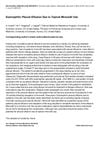3 citations,
January 1990 in “Cancer chemotherapy and pharmacology” Topical thiols may prevent hair loss caused by certain chemotherapy drugs.
 3 citations,
October 1988 in “Clinics in Dermatology”
3 citations,
October 1988 in “Clinics in Dermatology” Using 3% topical minoxidil can help women with hair loss, but more research is needed.
[object Object]  2 citations,
September 2023 in “Curēus”
2 citations,
September 2023 in “Curēus” Topical spironolactone may help treat ocular graft-versus-host disease with minimal side effects.
 2 citations,
July 2023 in “Journal of Cosmetic Dermatology”
2 citations,
July 2023 in “Journal of Cosmetic Dermatology” The topical treatment reduced hair loss and improved hair growth in patients with certain types of hair loss.
2 citations,
June 2023 in “Journal of clinical medicine” Soy supplements improve various skin conditions and aging signs, with topical use boosting skin barrier function.
2 citations,
January 2023 Nano-sized molybdenum may help treat hair loss and works well with minoxidil.
 2 citations,
December 2022 in “PNAS nexus”
2 citations,
December 2022 in “PNAS nexus” SCD-153 shows promise as an effective topical treatment for alopecia areata.
 2 citations,
September 2022 in “Bioscientia medicina”
2 citations,
September 2022 in “Bioscientia medicina” Topical vitamin D is effective in treating vitiligo with few side effects.
2 citations,
March 2022 in “Journal of Cosmetic Dermatology” Topical finasteride is a safe and effective treatment for pattern hair loss with fewer side effects than oral finasteride.
2 citations,
October 2021 in “Clinical and experimental dermatology” Cyperus rotundus essential oil effectively treats underarm darkening, reduces inflammation, and slows hair growth.
 2 citations,
May 2021 in “Research Square (Research Square)”
2 citations,
May 2021 in “Research Square (Research Square)” Ketoconazole loaded solid lipid nanoparticles can penetrate skin better than regular drug suspension and marketed product, providing slow, sustained release and improved stability.
2 citations,
February 2021 in “Case reports in dermatological medicine” The new topical botanical formulation significantly regrew hair in all five patients without side effects.
2 citations,
January 2021 in “Indian Journal of Dermatology, Venereology and Leprology” Betamethasone is more effective for hair regrowth than latanoprost but has more side effects.
 2 citations,
January 2021 in “JAAD Case Reports”
2 citations,
January 2021 in “JAAD Case Reports” Using a special laser and skin medication together successfully cleared a skin condition in a pregnant woman.
 2 citations,
March 2020 in “Skin”
2 citations,
March 2020 in “Skin” Using cidofovir cream for a rare skin disease can cause skin darkening.
 2 citations,
January 2020 in “International Journal of Cosmetic Science”
2 citations,
January 2020 in “International Journal of Cosmetic Science” Niacinamide does not promote hair growth.
 2 citations,
December 2019 in “Biomedical dermatology”
2 citations,
December 2019 in “Biomedical dermatology” Minoxidil works faster, but ketoconazole is a safer alternative for female hair loss.
 2 citations,
June 2019 in “PubMed”
2 citations,
June 2019 in “PubMed” A specific enzyme that activates the hair growth medication minoxidil when applied to the skin was identified.

A woman's use of minoxidil for hair loss caused fluid buildup in her chest, which went away when she stopped using the product.

Topical valproate can effectively promote hair growth.
 2 citations,
November 2017 in “Journal of Cosmetic and Laser Therapy”
2 citations,
November 2017 in “Journal of Cosmetic and Laser Therapy” JetPeel-assisted minoxidil improves hair density and thickness more than minoxidil alone.
 2 citations,
August 2017 in “Dermatologic Therapy”
2 citations,
August 2017 in “Dermatologic Therapy” Topical cetirizine 1% increases hair density and may be a promising treatment for hair loss.
 2 citations,
February 2016 in “British Journal of Dermatology”
2 citations,
February 2016 in “British Journal of Dermatology” Bimatoprost solution 0.03% is effective for treating sparse eyelashes.
[object Object]  2 citations,
March 2015 in “Dermatologic Therapy”
2 citations,
March 2015 in “Dermatologic Therapy” Using too much minoxidil foam can cause a rare movement disorder with facial twitching, but symptoms go away when the correct dose is used.
2 citations,
January 2009 A natural extract-based hair growth product was developed and showed promise in preliminary tests.
2 citations,
August 2007 in “PubMed” Topical scalp treatments could potentially reduce hair extraction.
 2 citations,
September 1997 in “Journal of The European Academy of Dermatology and Venereology”
2 citations,
September 1997 in “Journal of The European Academy of Dermatology and Venereology” Topical spironolactone effectively treats hair loss in women.
 2 citations,
March 1988 in “Archives of Dermatology”
2 citations,
March 1988 in “Archives of Dermatology” Minoxidil can help regrow hair or slow down hair loss, but results vary among individuals.
 2 citations,
November 1987 in “Archives of Dermatology”
2 citations,
November 1987 in “Archives of Dermatology” Lotions release minoxidil better than creams, with a recommended mix of propylene glycol, water, and ethanol improving effectiveness.
 2 citations,
November 1987 in “Archives of Dermatology”
2 citations,
November 1987 in “Archives of Dermatology” Minoxidil solution helps regrow hair in men with hair loss, with most improvement seen at 12 months and effects lasting over 30 months.




















